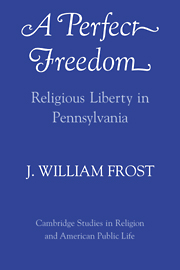Book contents
- Frontmatter
- Contents
- Acknowledgments
- Preface to This Paperback Reissue
- Introduction: The Pennsylvania Traditions of Religious Liberty
- I The Creation of Religious Liberty in Early Pennsylvania
- II Pacifism and Religious Liberty
- III The Clergy and Religious Liberty
- IV Religious Liberty in the Revolution
- V Religious Liberty and the Republic
- VI Politicians Debate Religious Liberty
- VII The Churches and Religious Liberty
- VIII The Legal Implications of Religious Liberty
- IX Religious Liberty and the Catholic and Jewish Minorities
- Epilogue: The Dismantling
- Notes
- Bibliography
- Index
VII - The Churches and Religious Liberty
- Frontmatter
- Contents
- Acknowledgments
- Preface to This Paperback Reissue
- Introduction: The Pennsylvania Traditions of Religious Liberty
- I The Creation of Religious Liberty in Early Pennsylvania
- II Pacifism and Religious Liberty
- III The Clergy and Religious Liberty
- IV Religious Liberty in the Revolution
- V Religious Liberty and the Republic
- VI Politicians Debate Religious Liberty
- VII The Churches and Religious Liberty
- VIII The Legal Implications of Religious Liberty
- IX Religious Liberty and the Catholic and Jewish Minorities
- Epilogue: The Dismantling
- Notes
- Bibliography
- Index
Summary
After the Revolution Pennsylvanians celebrated their religious liberties with eloquent slogans that passed over difficult issues. They approved of churches free from governmental control, a state separate from church and clerical politics, and the positive interaction of republican and Christian virtues in undergirding the society. The government sought and received the churches' support, and the churches needed and gained a fostering role by the state. Obviously, in such an ambiguous situation the clergy needed to define carefully their responsibilities on political-moral issues. This chapter examines church responses to the new constitutions, the one serious debate on the advisability of new constitutions' provisions on religion, and the ministers' actions on political-moral controversies, concentrating upon the regulation of alcoholic beverages.
The churches did not comment on changes in the religious clauses in the 1790 Pennsylvania constitution. All denominations saw the government as ratifying the status quo in which the state remained separate from the institutional church, and made laws to encourage moral living. Quakers complained that the new constitution did not treat conscientious objection to serving in the military as an absolute right. But they and the Mennonites and German Baptists made their peace with the state and Federal governments, accepted the new constitutions, and had their voting rights and ability to hold office restored. From then on, however, the sectarian churches withdrew from direct political activity, some of their members refused to vote or hold office, and the remainder played a negligible role in the political life of the Commonwealth.
- Type
- Chapter
- Information
- A Perfect FreedomReligious Liberty in Pennsylvania, pp. 105 - 123Publisher: Cambridge University PressPrint publication year: 1990



